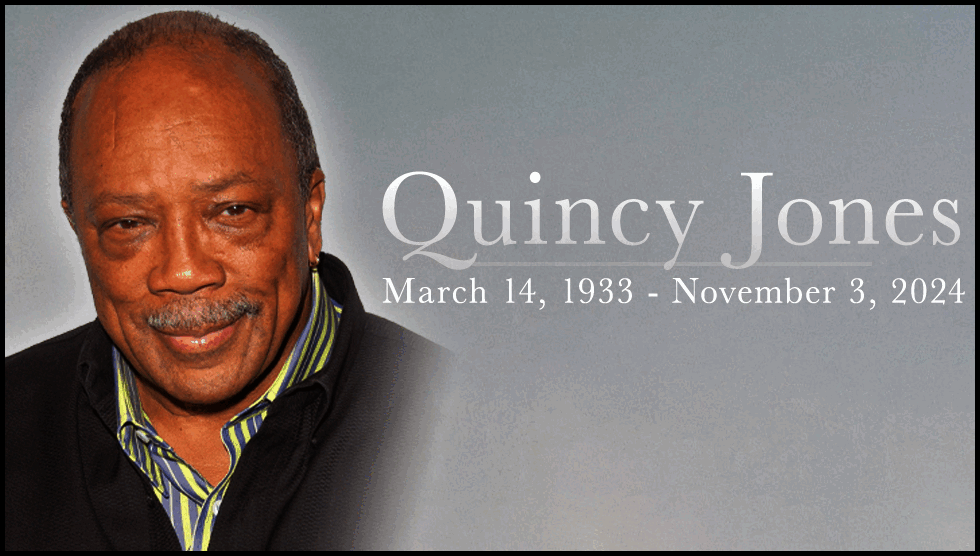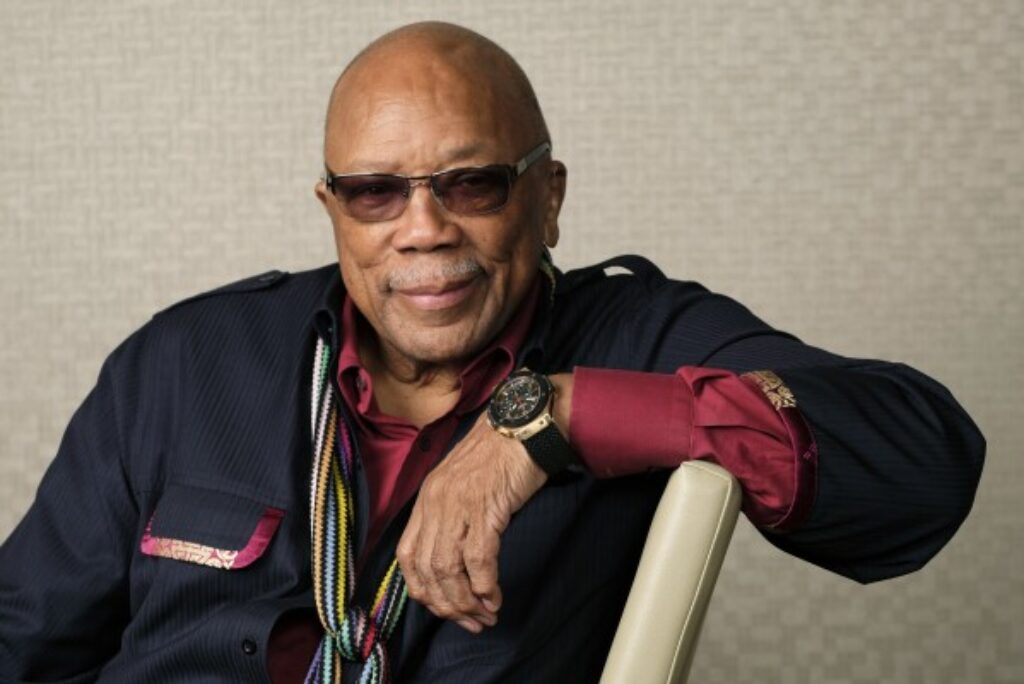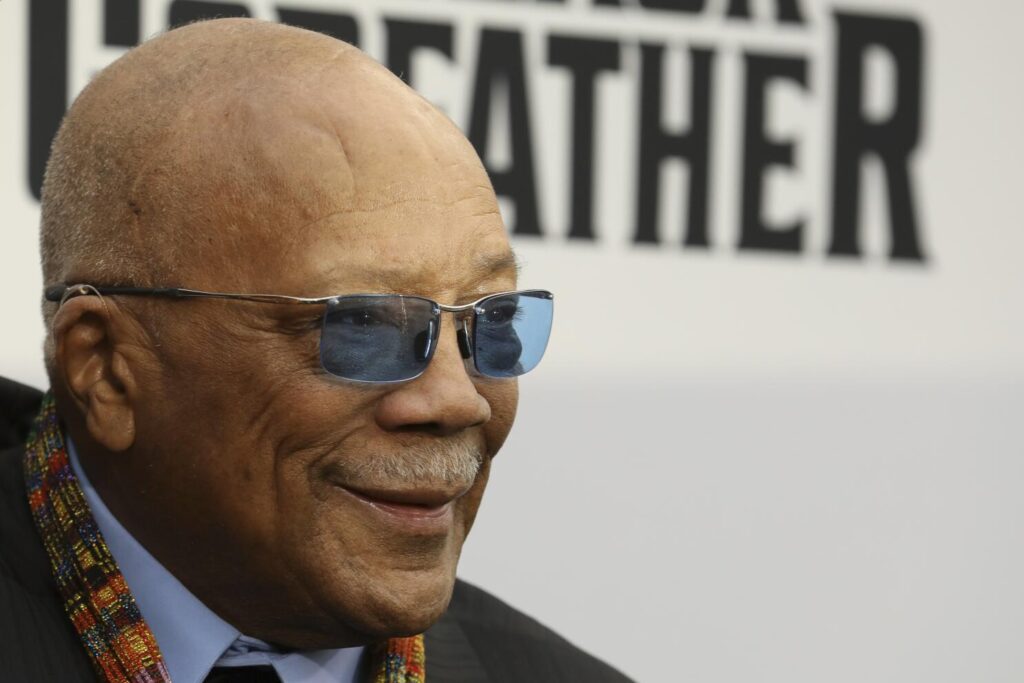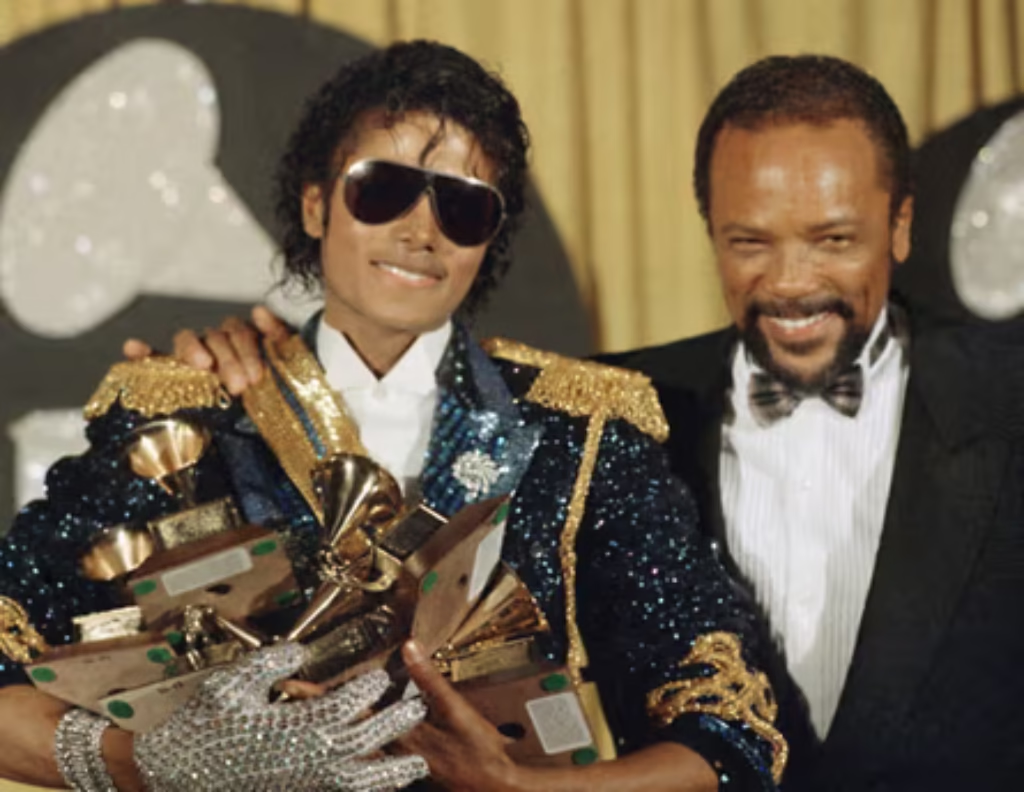
Quincy Jones, the legendary music producer and visionary whose influence spanned multiple genres and generations, has passed away at the age of 91. Jones’ remarkable journey through music, from jazz to pop and beyond, reshaped the entertainment landscape. Known for his collaborations with icons like Frank Sinatra and Michael Jackson, Quincy leaves behind a legacy as one of the most versatile and impactful figures in music history.

Early Life and Musical Roots
Quincy Delight Jones Jr. was born in 1933 in Chicago, Illinois. Growing up in a challenging environment during the Great Depression, he found solace in music early on.
Music became his escape and passion, and by the age of 12, he was playing trumpet and piano. His Chicago upbringing introduced him to jazz legends, inspiring his musical ambitions and planting the seeds of his future success.
Chicago’s Influence on His Style
Chicago’s rich jazz scene shaped Jones’ foundational style, exposing him to various musical forms and inspiring his later work across genres. His early experiences in the city’s vibrant musical landscape proved essential for his growth and determination.
The Rise of a Jazz Prodigy
Jones’ first foray into music was as a talented trumpet player. During his teenage years, his skills blossomed, earning him a spot in prominent jazz ensembles. By the 1950s, he was collaborating with jazz giants like Lionel Hampton and Count Basie, quickly gaining respect as a versatile performer in the jazz world.
From Performer to Visionary
After years of performing, Quincy began arranging music, signaling his transition from a musician to a visionary producer. His natural ear for harmony and rhythm made him an exceptional arranger, setting him apart in the music industry.
Expanding into Arranging and Producing
Quincy’s move into arranging and producing opened doors to new artistic possibilities. In the 1950s, he worked alongside leading jazz musicians, creating arrangements that amplified their unique styles. Jones’ ability to understand and enhance the strengths of others’ music marked him as a natural-born producer.
Key Collaborations in the Jazz Scene
During this era, Quincy collaborated with jazz icons like Dizzy Gillespie, helping him refine his craft and broaden his musical influence. His connections in jazz set the stage for his later successes in other genres.
Quincy’s Partnership with Frank Sinatra
One of Quincy’s most notable collaborations was with Frank Sinatra. Their connection began in the 1960s and flourished through numerous projects, with Sinatra personally requesting Jones to conduct his 1964 performance in Las Vegas. This partnership produced unforgettable moments in music, including Sinatra’s classic album Sinatra at the Sands.
A Friendship That Defined an Era
Jones and Sinatra shared a mutual respect that went beyond music. Their friendship not only led to timeless hits but also exemplified the power of cross-genre collaboration.
Crossing into Pop Music
By the late 1960s, Quincy’s ambitions extended beyond jazz, leading him into pop music. He recognized the potential of pop to reach broader audiences, and his early projects in the genre showcased his adaptability. This shift allowed him to collaborate with pop artists, further cementing his status as a versatile producer.
Notable Early Pop Projects
Quincy’s work with artists like Aretha Franklin and Ray Charles demonstrated his skill in blending jazz with pop, creating unique sounds that appealed to fans of both genres.
The Legendary Journey from Chicago’s Streets to Global Music Icon
Quincy Jones’ life story is one of resilience, innovation, and a profound impact on music and culture. Born in Chicago in 1933, he grew up in challenging circumstances, with a difficult childhood that included his mother’s institutionalization and time spent on the streets. Music became his refuge and, from a young age, he discovered a passion for the piano, later excelling in trumpet and forming a lifelong friendship with Ray Charles. After attending Berklee College of Music briefly, he joined Lionel Hampton’s band, marking the start of his career as a composer, conductor, and arranger.

Jones’ achievements include breaking racial barriers as a vice president at Mercury Records and serving as the first Black musical director for the Academy Awards in 1971. His work on Michael Jackson’s Thriller, Off the Wall, and Bad solidified his place in music history, along with composing soundtracks for Roots and In the Heat of the Night. The first film he produced, The Color Purple, received 11 Oscar nominations. Throughout his life, he received an array of honors, including 28 Grammy Awards, an Emmy, and the Legion d’Honneur from France. His business ventures included founding Quincy Jones Entertainment, which launched Vibe magazine and Qwest Broadcasting, sold for $270 million in 1999.
Jones’ career was celebrated in multiple documentaries and a bestselling memoir, Q, where he shared his philosophy of valuing talent and treating people with respect, regardless of their background. His journey from the streets of Chicago to global fame exemplifies his belief in the transformative power of music and perseverance.
The “Thriller” Phenomenon with Michael Jackson
Quincy’s work with Michael Jackson on the album Thriller redefined pop music. Released in 1982, Thriller remains one of the best-selling albums of all time. Jones’ production was groundbreaking, combining pop, rock, and R&B elements in a way that captivated listeners worldwide.

Impact of Thriller on Pop Culture
Thriller didn’t just break records—it influenced fashion, dance, and music videos, marking a cultural shift that elevated Jones’ legacy to unprecedented heights.
Influence on Film and Television
Quincy’s talent extended to film and television scoring. His work on In Cold Blood showcased his cinematic sensibility, while his score for The Color Purple added emotional depth to the film. Jones also played a role in bringing music to television, contributing to “The Fresh Prince of Bel-Air” and other series.
Pioneering Black Representation in Hollywood
Through his work, Quincy pushed for more diversity and representation in Hollywood, paving the way for future generations of African-American musicians and filmmakers.
Shaping the Music Industry Beyond Sound
Quincy wasn’t only a producer but also a business mogul, shaping industry standards and production methods. As the founder of Qwest Records, he created opportunities for emerging artists and established new norms in music production.
Innovations in Music Production
From sound engineering techniques to business models, Jones was at the forefront of industry innovation, influencing the way modern music is created and distributed.
Philanthropic Efforts and Social Advocacy
Throughout his life, Jones was dedicated to social justice and philanthropy. He participated in projects like We Are the World, supporting global causes and humanitarian efforts. His commitment to giving back made him not just a music legend but a social advocate.
Prominent Causes He Supported
Quincy championed causes ranging from civil rights to education, often using his influence to advocate for positive change in society.
Awards and Accolades
Quincy’s career was marked by numerous awards, including 28 Grammy Awards and a Grammy Legend Award. His impact on music and culture earned him global recognition and admiration.
Lifetime Achievements
Beyond the Grammys, Jones received honorary degrees, a Kennedy Center Honor, and the National Medal of Arts, underscoring his immense contributions to the arts.
Quincy’s Personal Life and Relationships
Jones was known for his close relationships and family bonds, which influenced his work and perspective on life. His personal journey, filled with love and loss, shaped much of his artistic expression.
Legacy in Mentoring and Supporting Young Artists
Jones believed in nurturing talent and spent much of his later years mentoring young artists. He saw this as a way to continue his legacy, helping new generations of musicians find their voice.
Quotes and Tributes from Industry Legends
Many prominent figures in the music industry have shared tributes to Jones. His contributions inspired countless artists, and their words serve as a testament to his lasting impact.
Conclusion
Quincy Jones may be gone, but his influence will echo through music for generations. From jazz to pop, from film scores to social activism, Jones left a mark on every arena he entered. His legacy lives on, inspiring musicians and artists around the world.
FAQs
- What was Quincy Jones’ greatest achievement in music?
- Producing Michael Jackson’s Thriller is often seen as Jones’ most impactful contribution to music, redefining pop music globally.
- How did Quincy Jones impact the music industry?
- Quincy introduced innovative production techniques, collaborated across genres


